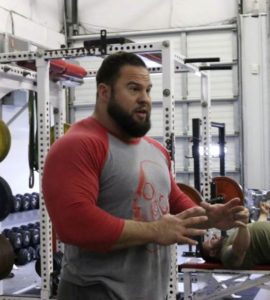
15 Apr Do You Fly By The Seat Of Your Pants?
By: Brian Carroll
I sure hope not.
Such a cliché right? I sell a philosophy, live by and preach a strength training plan. So it obviously goes without saying that I have a dog in this fight, right? Sure, I do. Most definitely do but, as I’ve said many times – 10/20/Life is fully customizable and is more than just a program. It’s a philosophy of training used indefinitely. It’s a training road map that you customize depending on where you need to go.
[wa-wps]
But why is it so important to have a plan? Granted, some people can do just fine without a plan. Chances are you are not one of these guys or gals. Because without a plan, you are looking to fail in many ways. The door is left open in a few ways, if you will. Fail to plan, plan to fail as they say right? A lot of the time that is the case. Sometimes, we can fly by the seat of our pants and just throw it together and make it work, but this doesn’t always happen. This can also teach us bad habits, as I’ve been victim of this.
Then again, just because you plan things out 100% doesn’t mean that it will be a success. However, much like the baseline article I have written about many times, you need to have things written down (or at the very least, documented) to see and if you fail or succeed and where the things went wrong or right. Basically, you need to know what the hell works and what doesn’t so you don’t repeat the same crap over and over – as I have.
I’ve been bad at times about just counting on my memory to remember the pitfalls and traps I’ve fallen into in the past with nutrition, training, prep and all sorts of shit. I found myself snagged by the same issues more than once, and this really makes me mad. Want to get mad? Make the same painful mistake over that you promised yourself you would totally avoid. Like touching a hot stove as a kid, you will learn eventually. I hope at least…haha.
I guess what I’m getting at as well as the purpose of this article what one of my biggest pet peeves is. Which is just going in the gym to have fun with no plan or purpose. “Chaos training” for lack of a better way of putting it, if you will. Do you know what happens when someone, especially a specialized strength athlete of some type (powerlifter, weightlifter, crossfitter, strongman, etc.) and men (especially) and their egos when left to their own devices? They hurt themselves, push too hard and set themselves back. Or even worse, they start to become undisciplined since this time they got away with some monkey shit and it taught them this is ok, subconsciously.
Here’s a few things I keep in mind when I program, answer questions, when people ask me about their program or if I’m going through someone’s program, their videos or their training log.
We never do just as much as possible in the gym.
To me this is stupid unless maybe you are a straight up 100% bodybuilder, and then I understand because hypertrophy and pure strength training are much different. I also understand I’m no expert on this so I wont go much into this as I’m not a bodybuilder or hypertrophy specialist. This is asking to create CNS burnout or injury for a strength athlete. Do as much as needed and no more at a time and only add some when it’s necessary – you refer to your baseline again and you either add or take in away in small increments with minimal variables at a time.
We always deload BEFORE it’s absolutely necessary.
Yes, I advocate a deload every three weeks, but this is not written in stone. Sure, you can go 3-4 weeks without a deload. However, what I don’t advocate is 5-6 weeks straight of heavy work. This applies especially when training for a meet; which ensures you are pushing things too hard, likely to peak early and get burnt out. This happens very often. Deloading is not an evil word, just like rest isn’t. People are just scared to let their hard work come to fruition because they are not confident in the process. You get stronger during the deload and when you allow for your body to rest and recover, not weaker. I don’t care the work capacity, everyone needs scheduled deloads. This is just as much as a mental break as a physical one. You need to know that they are not going to always feel 100% necessary and many times when you really need one, it may be too late for you. If this is the case, you may be in for a long 3-5 weeks.
We always ask ourselves risk vs. reward in everything we do, no matter what.
Less the goofballs on my website doing pull-ups for 20-25 reps (which I don’t suggest), mind you. You have to ask yourself – will this make me better, do I need to do it and is this too risky? What is there to gain from this? I bet if you asked Scott, Danny, Dean, Will and others what they had to gain from this (as they are all primarily strength training athletes and not endurance athletes), they would smile, look down and agree that there is way more risk involved than any type or associated reward with max set’s of pull-ups while cranking out reps in a fatigued state. It’s a fun & friendly competition but that’s about it . Love you guys, but it’s the truth. Don’t rip off a bicep, lat, pec or a delt for meaningless ego strokes. Yes, you too Mr. Neck Surgery 7 months ago!
If in doubt, you shut it down for the day or week.
Yes, if in doubt things are feeling a little crappy in the gym especially when heavy weight is involved, it’s a good idea to shut it down. Are you hurt/smart or are you being a pussy? There is a big difference between the two. As I say in 10/20/Life, you have to know the difference in the two. If you’re in a competition, you should be more likely to go for it, right? In training, usually will you have to have a training session (I get that near a competition when you need to hit numbers) that you cannot miss no matter what? No, not usually! I remember reading Dorian Yates years back talk about he will go into the gym and he’s had many days where he wouldn’t feel right or into the session for whatever reason and would pack his shit and go home, then reboot and come back the next day. I’ve done this before a few times. Much better than going through the session mentally limping or getting injured because you aren’t totally focused on the task at hand. Remember, lifting heavy weights is therapeutic for some, I won’t argue this point. That being said, those that are borderline addicted to just training must proceed with caution as you have to take time off from time to time. What’s worse, missing a day or two to get some rest or having to rehab for 6 months because you didn’t shut it down?

It’s a marathon not sprint.
Yep, so cliché, but it’s true. With the 10/20/Life approach nothing is rushed, forced too hard and it’s about the big picture thinking. Not just one, two years or even five, but the next 10-20 years of your life and beyond. Most of you and us are not going to be outliers like the many freaks I’ve mentioned over the years. Most will, if lucky make small gains and improvements over time while being around in your given sport and having longevity. Longevity will not come without a little bit of luck, decent nutrition, good decision making, learning from mistakes and knowing when to coast and when to floor it. This is what separates the average from good, the good from great and the great from legends. Once the initial large gains are realized, then the gains become very hard to come by over time. This is where we lose a lot of our ‘lifters’ after a few years. It tends to become hard. Trust me, I know.
To close – remember even with the best plan, the most effort and the most heart, there are still no promises of success. Remember this.
Brian Carroll
Latest posts by Brian Carroll (see all)
- Protected: -Header Image Post Template 2024 - April 18, 2024
- Brian Carroll X Professor Stu McGill full interview 2024 - April 16, 2024
- Protected: -Video Post Template 2024 - April 15, 2024







Sorry, the comment form is closed at this time.